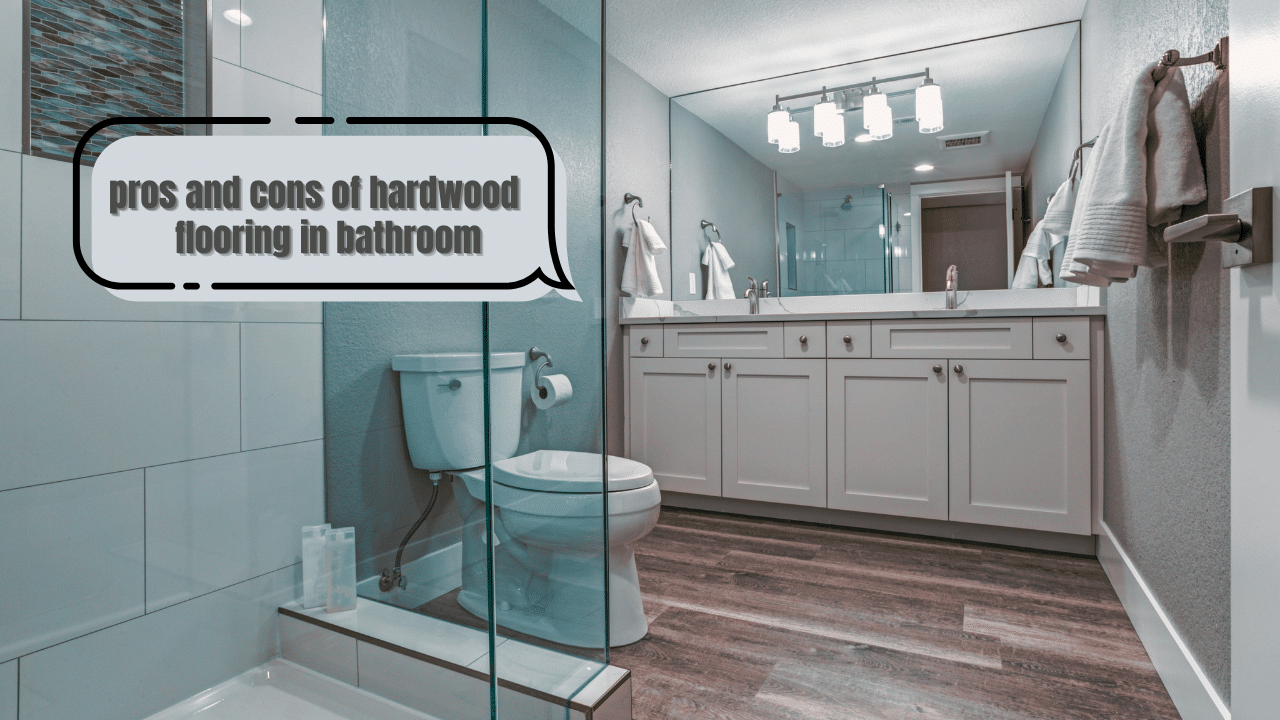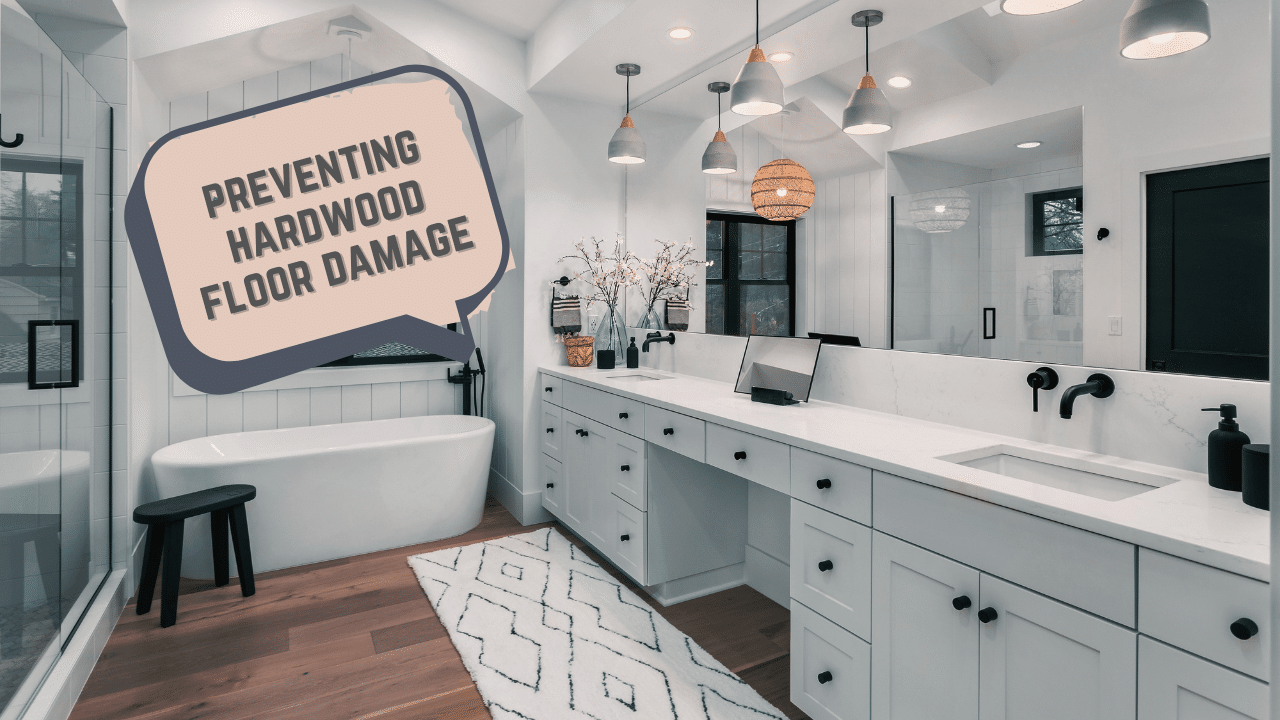Hardwood floors have long since been a crowd-favorite when it comes to interior flooring projects. Why? The material is highly durable, low-maintenance, and offers a stunning natural aesthetic. (Related: The Best Types of Kitchen Flooring For Your Needs)
However, it’s not all rainbows and butterflies, as hardwood floors in the bathroom may present specific problems.
For one, you will need to pay more careful attention to its upkeep, especially in such a humid and moist environment. Moisture is the #1 enemy of hardwood– as it deteriorates the material quality. And since it is usually damp most of the time, it may even encourage possible mold growth.
If you’re considering hardwood floors for your bathroom, let’s discuss its advantages and disadvantages and everything you need to know about it.
Advantages of Hardwood Floors in Bathroom
There are a couple of advantages to choosing hardwood floors for your bathroom.

Added Warmth
Unlike ceramic tiles that can be chilly in the winter months, hardwood flooring is warmer and more comfortable to walk barefoot.
Sometimes, you don’t need to wear slippers, especially when taking quick bathroom breaks in the middle of the night. It’s why you need to have comforting bathroom floors to walk on any time of the day.
Other than that, earth-tone colored hardwood floors in the bathroom also make it look cozier and more welcoming.
Aesthetic
Simply put, hardwood floors in the bathroom are an elegant addition. It gives a sense of unique, natural beauty– with every plank presenting nature’s artwork in its distinctive grain pattern.
The best part? Hardwood floors do not need to blend with particular color schemes or room themes. Adding it into your bathroom will undoubtedly add an elegant touch to the space.
Long-Lasting
You can expect your solid hardwood floors to last up to 25 years or more with proper maintenance. It’s second to ceramic or stone tile when it comes to the average lifespan. Suppose the hardwood flooring gets scratched– there’s no need to worry. You can sand and refinish the surface, and it will appear good as new.
Some variations, such as engineered hardwood flooring, can be less durable. It is made of a hardwood surface layer that’s laminated to core layers.
It’s continuously gaining traction nowadays as it is easy to maintain and cheaper than other alternatives.
Disadvantages of Hardwood Flooring in a Bathroom
As previously mentioned, moisture may affect the hardwood flooring in your bathroom. Here are some other setbacks to expect:
Spills and Splashes
All flooring in the bathroom is at risk of damage from frequent spills and splashes, mainly due to showers and baths.
While the coat finishing may protect the flooring material, wipe any spills dry immediately. It prevents the moisture from wearing on the hardwood floors in the bathroom or seeping down in between the seams.
Manufacturer warranties are also voided once any puddle or spills aren’t wiped off immediately.
No Moisture Barrier
Standard hardwood flooring installation involves nailing the planks to the subfloor directly. Hence, you may be unable to use a vapor barrier as the nails can puncture it in the process.
Once moisture finds its way to the floor’s structural components– your subfloor and underlayment are at risk. If you decide on hardwood floors in the bathroom, opt for adhesive or click-together variants.
Floor Slope
Homeowners with uneven bathroom floors may have frequent puddling problems, especially when water slides down the low areas.
As previously mentioned, moisture puddles may damage the flooring and weaken its structural integrity. That said, you may need to prepare the subfloor to be perfectly level and flat before installing hardwood floors in the bathroom.
Chemical Staining
Given that different cleansers and soaps are used in bathrooms, these chemicals may damage your hardwood floors. Keep in mind that these are typically acidic, so once they splatter or spill on hardwood floors– they may leave behind a permanent stain or destroy the surface finish.
If you accidentally spill cleansers or body products on your hardwood floors, ensure they are properly cleaned up immediately.
High Humidity Levels
Aside from standing water from splashing, the high humidity levels in a bathroom may also be damaging to your hardwood floors. Not only does it attack the flooring’s surface, but it may also damage the bottom, which usually doesn’t have finished treatment.
If your bathroom sees heavy use daily, the hardwood floorboards may twist, plump, or warp due to the constant high humidity levels.
With that in mind, ensure your bathroom has proper ventilation by installing the right number of exhaust fans. Have it run during and after you take a shower or warm bath.
Mold and Mildew
Given that the bathroom is constantly moist, you are most likely to deal with possible mold and mildew problems at some point. These pests thrive in wet environments and feed on organic materials, like hardwood floors.
Although the finishing coating serves as an added layer of protection, mold and mildew may still grow in between or below the boards.
These can be quite a severe problem if you have specific allergies and sensitivities.
Hardwood Flooring Alternatives
Homeowners who find it a chore to maintain the upkeep of hardwood floors in the bathroom may consider alternatives, such as faux hardwood surfaces.
These mimic the appearance of natural wood, making it difficult for any onlookers to tell them apart at once. Other excellent alternatives also include natural wood-like ceramic tiles. You may also opt for treated decking wood, which gives you flooring material that’s already treated against moisture damage.
It will require you to keep a close eye on its emission levels and chemical composition, though. Ensure to choose safe variants for treated floors in the bathroom. Many water sealing finishes in the past are notorious for their toxicity levels.
How Can I Prevent Hardwood Floor Damage?
As previously mentioned, hardwood floors in the bathroom are at risk of water damage. These floors require extra care and upkeep compared to other bathroom flooring choices. However, plenty of homeowners have successfully maintained their bathroom hardwood floors.

If you want to join the growing list, here are some quick preventative tips to keep in mind:
